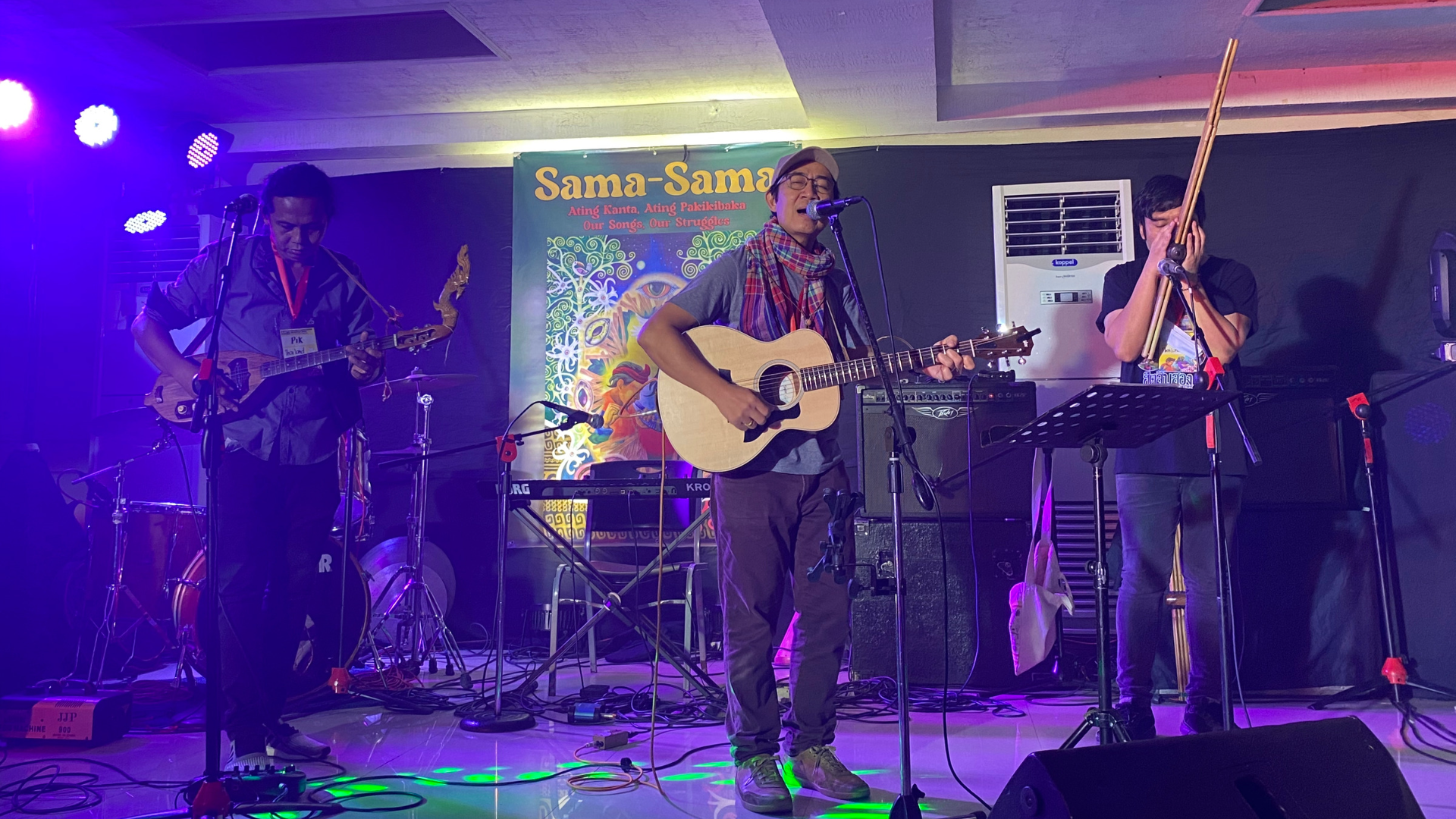Mga Asyanong musikero, nagsama-sama
Naniniwala ang AMP3 na sa paglipas ng panahon, ang musika ay hindi lamang panandalian na naririnig o inaawit, ito rin ay isa sa mabisang pagpapahayag ng kalayaan, kapayaan, at pag-unlad ng lipunan.


Nagtipon-tipon sa unang pagkakataon ang mga miyembro ng Asian Music for Peoples’ Peace and Progress (AMP3) para sa konsiyertong “Ating Awit, Ating Pakikibaka: A Culture of Resistance and Solidarity” sa University of the Philippines Diliman nitong Hunyo 20.
Kabilang sa mga nagtanghal na progresibong banda at musikero ang Pasada, Musikang Bayan, Village Idiots, Bong Ramilo, Mara Peralta, Dania Reyes, Aniya Kalinaw, Boy Dominguez, Aila Bathan, at Katrina Nicole Abuda (Philippines); Ae Niti’kul, Pakapol Kornkranok, Nutchanon Pason, Chi Suwichan, at Jenny Kuewa (Thailand); Samageet (Bangladesh); Vedi Sinha at Sumant Balakrishnan (India); Ika Yuliana at Robi Supriyanto (Indonesia); Kyaw Lin (Myanmar); Messenger Band (Cambodia); at Ikuta Manji (Japan).
Isa sa mga adhikain ng organisasyon ang pagpapatibay ng samahan ng mga musikero sa Asya bitbit ang mga kolektibong panawagan sa mga isyu at problemang kinakaharap ng mga mamamayang Asyano sa pamamagitan ng musika.

“Repleksiyon siya ng freedom of expression, pag-amplify din kumbaga ng voice of the voiceless. ‘Yong mga hindi makapagsalita o hinaharap ng dahas dahil sa kanilang posisyon o pagtutol sa ibang mga polisiya, minsan kapag pinahiwatig mo sa paraan ng [musika] mas marami kang naaabot, at mas naiintindihan ng mga tao ‘yong issues,” ani Joseph Purugganan, miyembro ng AMP3.
Sa kabila ng mga pagkakaiba, partikular na sa wika ng mga awit, hindi pa rin napigilan ng mga manunuod na makisabay sa ritmo at indayog ng musika.
Ayon sa mang-aawit na si Vedi, mayroong malalim na koneksiyon na siyang nagbubuklod sa atin sa pamamagitan ng musika.
“You don’t understand all the lyrics because of language, but you feel the pain, you feel the anger, you feel the love through that,” aniya.
Nagtanghal din ng gabing iyon si Aniya Kalinaw, na nangangahulugang “she said peace,” isang guro at artista mula sa Batangas City na lumilikha ng mga awit hango sa mga tunog, tanawin at mga kuwento mula sa buhay sa kanayunan.
Ayon sa kanya, nagbibitbit din ang musika ng kasaysayan, pakikibaka, hinanakit at maging pag-asa ng mga tao.
“Lumikha ka nang lumikha tapos makinig ka nang makinig kasi lahat tayo may message na gustong sabihin, at lahat din tayo may kakayahan na mag-empathize sa istorya ng iba, if we could just listen to one another,” payo ng mang-aawit.

Naniniwala naman ang organisasyon na sa paglipas ng panahon, ang musika ay hindi lamang panandalian na naririnig o inaawit, ito rin ay isa sa mabisang pagpapahayag ng kalayaan, kapayaan at pag-unlad ng lipunan.
Huling bahagi ang nasabing konsiyerto ng tatlong araw na Consultation on People’s Music.
Maaaring mapakinggan ang ilan sa mga artista at musikerong nabanggit tulad ng Pasada, Musikang Bayan at Village Idiots sa mga music streaming platform o mapanood ang kanilang mga music video sa YouTube.
(English translation)
Asian musicians unite
Members of Asian Music for People’s Peace and Progress (AMP3) came together for the first time in a concert “Our Songs, Our Struggles: A Culture of Resistance and Solidarity” at the University of the Philippines Diliman last June 20.
Performances included Pasada, Musikang Bayan, Village Idiots, Bong Ramilo, Mara Peralta, Dania Reyes, Aniya Kalinaw, Boy Dominguez, Aila Bathan, and Katrina Nicole Abuda (Philippines); Ae Niti’kul, Pakapol Kornkranok, Nutchanon Pason, Chi Suwichan, and Jenny Kuewa (Thailand); Samageet (Bangladesh); Vedi Sinha and Sumant Balakrishnan (India); Ika Yuliana and Robi Supriyanto (Indonesia); Kyaw Lin (Myanmar); Messenger Band (Cambodia); and Ikuta Manji (Japan).
One of the advocacies of the organization is strengthening the solidarity of progressive and socially active musicians around Asia to form a collective force that will narrate people’s struggles through the power of music.
“It is a reflection of freedom of expression, also, it amplifies the voice of the voiceless. Those who cannot speak or those who face violence because of their position or opposition to other policies, sometimes when you express it through [music], it widens your reach, people will understand the issues better,” said Joseph Purugganan, a member of AMP3.
Despite the differences, particularly in the languages used in their songs, the crowd could not stop moving along to the rhythm and beat of the music.
According to Vedi, an Indian artist, music has a deep connection that binds us together.
“You don’t understand all the lyrics because of language, but you feel the pain, you feel the anger, you feel the love through that,” she said.
Another performer was Aniya Kalinaw, which translates to “she said peace,” a teacher and artist from Batangas City who mainly writes songs inspired by natural sounds, scenery and stories from rural life.
According to her, music carries history, struggle, resentment and even serves as a hope for the people.
“Just keep creating and listening because we all have a message to convey, and the ability to empathize with the stories of others, only if we could just listen to one another,” she added.
AMP3 also believes that throughout the years, music has been one of the effective ways to tell people’s aspirations for freedom, peace and social progress. It no longer serves as something that we consume just for us to listen and sing along.
The event marks the culmination of a three-day Consultation on People’s Music.
Some music of the mentioned artists and performers, such as Pasada, Musikang Bayan, and Village Idiots, are available on music streaming platforms and watch their music videos on YouTube.
